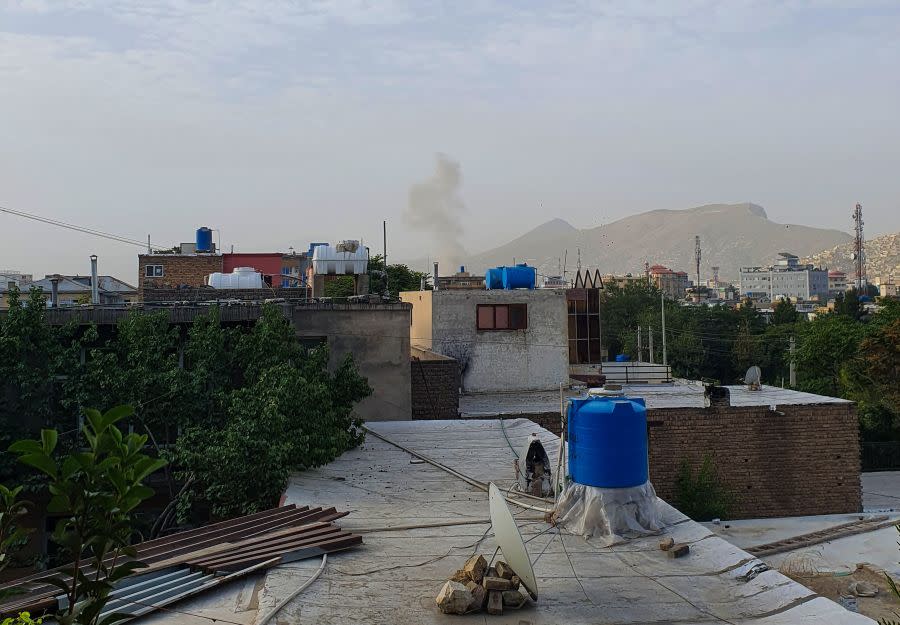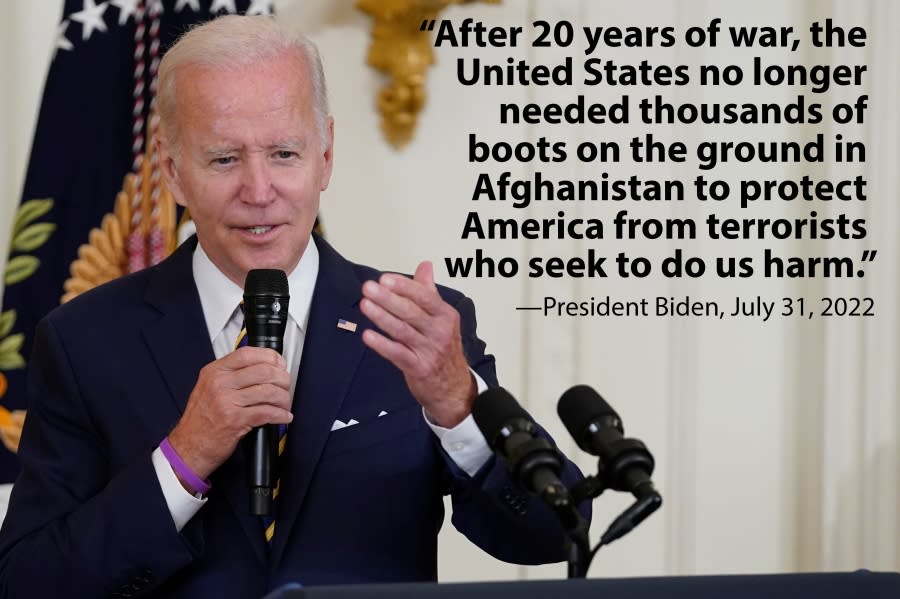Fears over Afghanistan threat simmer, despite White House assurances

When the United States pulled its troops from Afghanistan in a chaotic dash, the Biden administration and its critics traded fire over whether America could keep its borders safe from terrorist threats without boots on the ground.
A year later, that debate is still raging.
While the Biden administration has pointed to key wins from afar — in particular a Kabul drone strike earlier this month that killed longtime al Qaeda leader Ayman al-Zawahiri — former and current defense officials and experts harbor doubts that the U.S. is safe from future threats with its troops gone from the region.
“It means that we are going to have to be very vigilant about the potential for terrorism to raise its ugly head out of Afghanistan again,” former Defense Secretary Leon Panetta told The Hill.
That isn’t easy when the U.S. doesn’t have a presence in a country, he said.
“I think there’s a lot we don’t know about what’s going on in Afghanistan.”
– Colin Clarke, research director at global security firm the Soufan Group.
While the al-Zawahiri strike showed the U.S. can still hit at terrorists, the leader’s presence in Afghanistan also proved a long-held concern that the Taliban would provide safe haven for extremist organizations, as it did leading up to the attacks of Sept. 11, 2001.
And without eyes and ears on the ground, it’s difficult to discern the extent to which al Qaeda could regrow in Afghanistan and be able to conduct operations outside of the country, Clarke said.
Al-Zawahiri’s Kabul location was “just further proof of what myself and most counterterrorism experts have been saying since last year — which is it’s wishful thinking at best and naivete at worst to think that the Taliban and al Qaeda are going to break in any meaningful way. It’s just not going to happen,” Clarke added.

The administration has been grilled in Congress for its failure to foresee the Taliban’s rapid takeover after the U.S. exit, and the bungled handling of the withdrawal of some 120,000 Afghans — during which 13 American service members and more than 170 Afghan civilians were killed in a suicide bombing at Kabul’s airport. Friday marked the one-year anniversary of the deadly attack, which also wounded at least 150 others.
Last week, Republicans on the House Foreign Affairs Committee released a 121-page report that investigated the U.S. effort, blaming the Biden administration for having no solid plan in place once all U.S. troops left Afghanistan.
“The choices made in the corridors of power in D.C. led to tragic yet avoidable outcomes: 13 dead service members, American lives still at great risk, increased threats to our homeland security, tarnished standing abroad for years to come, and emboldened enemies across the globe,” Republicans said in the report.
The White House, in turn, issued a memo brushing aside the GOP investigation, accusing it of advocating “for endless war and for sending even more American troops to Afghanistan.”
The administration further argued its decision strengthened national security and did not compromise America’s ability to extinguish terrorist threats.
The memo pointed to U.S. intelligence assessments that found al Qaeda has not reinstated itself in Afghanistan, with “less than a dozen” operatives in the country, and only al-Zawahiri so far attempting to restart operations there.
The terrorist group “does not have a capability to launch attacks against the U.S. or its interests abroad from Afghanistan,” and “neither the few remaining [al Qaeda] core members nor its regional affiliate are plotting to attack the Homeland,” White House National Security Council spokeswoman Adrienne Watson wrote in the memo.
But Dustin Carmack, the former chief of staff to ex-Director of National Intelligence John Ratcliffe, said that al-Zawahiri’s occupancy in Kabul appeared to highlight Washington’s dearth of intelligence capabilities now that U.S. forces are gone.
“We are flying blind to a large extent,” said Carmack, now with the Heritage Foundation.
“We still have a lot of capabilities, a lot of ability to go after folks but … how we left Afghanistan and just the way in which we removed any kind of contingencies of elements to be able to go execute proper [counterterrorism] strategies, it’s just an alarming failure because we’re going to be dealing with this for a long time.”
And Clarke said it’s likely a matter of time before al Qaeda could launch an attack against the West. While it’s unlikely the group would be able to pull off anything on the scale of 9/11, there is the possibility of smaller but deadly attacks. He pointed to the al Qaeda-directed commuter train bombings in March 2004 in Madrid that killed 193 people and the July 7, 2005, London transportation bombings that killed 52 people.
“These attacks against soft targets — transportation, infrastructure, things like that — I think are certainly within al Qaeda’s capability set or skill set in the next year to 18 months. And that’s a significant possibility. It’s a real threat,” he said.

The White House’s confidence is also not shared by some former military leaders that oversaw the region firsthand.
Two former heads of U.S. Central Command (Centcom) — retired Gen. Frank McKenzie and retired Gen. Joseph Votel — have publicly argued that the U.S. is less safe now than it was a year ago.
“I do not believe we are safer as a result of our withdrawal from Afghanistan,” the recently retired McKenzie, head of Centcom from 2019 to 2022, told Voice of America on Monday.
His predecessor Votel, leader of Centcom from 2016 to 2019, told the outlet that there remains “a lot that we don’t know about the organizations, the terrorist organizations that are left on the ground.”
“I don’t think we’re more stable or more safe,” Votel added. “I think Afghanistan is more unstable and, as a result, that this region is more unstable.”
Both McKenzie and Votel had also recommended the president keep a U.S. troop presence in Afghanistan.
“I just don’t buy the idea that we had to pull everybody out,” Votel said, noting that he feared the “forever war” narrative pushed by the past two administrations “overtook smart, strategic decisionmaking.”
Even with the White House pointing to its recent win with the al-Zawahri strike, the government remains wary when it comes to the region, and particularly the Taliban.
The administration last week ruled out releasing $3.5 billion held in the U.S. back to Afghanistan’s central bank, citing the al Qaeda leader’s former presence in Kabul. The al Qaeda leader was killed on the balcony of a house tied to the Taliban.
“We do not have confidence that that institution has the safeguards and monitoring in place to manage assets responsibly,” Thomas West, the American government’s special representative for Afghanistan, said in a statement first reported by The Wall Street Journal.
“And needless to say, the Taliban’s sheltering of Al Qaeda leader Ayman al-Zawahri reinforces deep concerns we have regarding diversion of funds to terrorist groups.”

Beyond fears over al Qaeda, concerns also remain as to the Taliban’s ability to keep at bay the Afghan branch of the Islamic State, known as ISIS-K. Before and after U.S. troops left Afghanistan, the terrorist group staged numerous bombings, assassinations and suicide attacks that the Taliban has been unable to combat.
U.S. defense and intelligence officials have voiced fears that left unchecked, such groups, including al Qaeda and ISIS-K, may soon develop capabilities to launch attacks across borders.
Shortly after the U.S. withdrawal from Afghanistan, Joint Chiefs of Staff Chairman Gen. Mark Milley in September told lawmakers that the extremist organizations could build up a capability to attack the United States in one to three year’s time.
That assessment appeared to be supported by Centcom head Gen. Michael Kurilla, who in June said U.S. intelligence confirmed that terrorist groups have begun to build training camps inside Afghanistan.
Carmack, meanwhile, said Milley’s predicted timeline could likely be sped up.
“I think they’re being a little almost rosy in their thoughts, because when these guys have the ability to kind of grow and just run around Kabul and start being able to communicate globally again — at least more than what they were doing maybe a few years ago — they will be seeking new targets,” he said.
For the latest news, weather, sports, and streaming video, head to The Hill.

